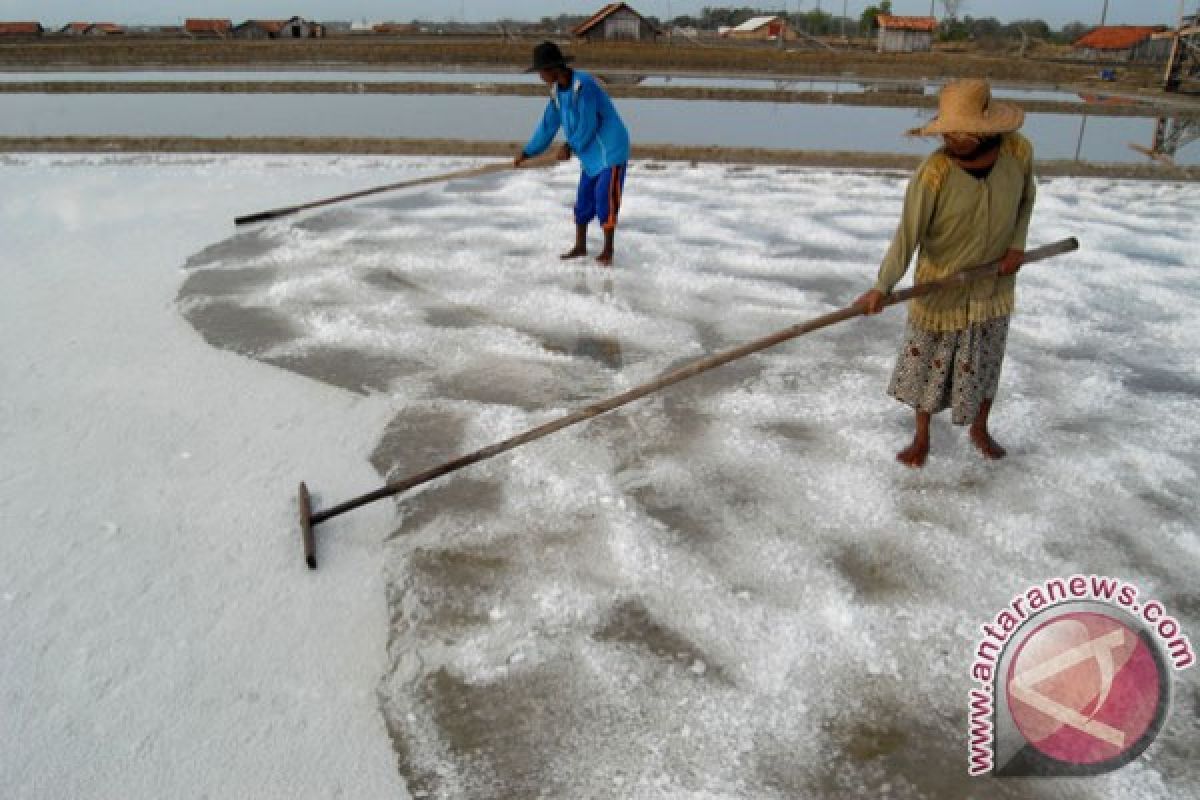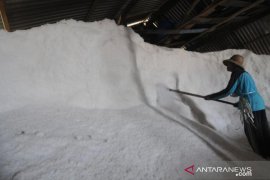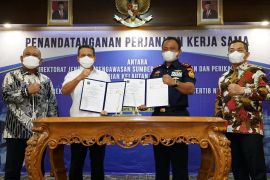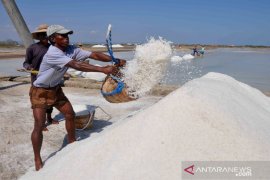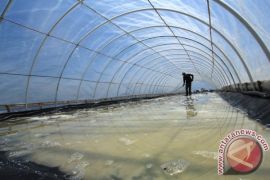..., but the salt importers showed no goodwill."Jakarta (ANTARA News) - The Indonesian government plans to revise its regulation on salt imports in order to increase domestic purchases of locally produced salt.
Currently, salt imports are based on Trade Ministers Regulation No. 58/M-DAG/PER/9/2015 on Salt Import.
"We have set up a team to revise Trade Ministers Regulation No.58/2015. We want to regulate three issues on salt imports," Karyanto Suprih, the acting director general of External Trade of the Ministry of Trade, said on Wednesday, Aug. 19.
He made the remarks in response to calls by farmers that the government should stop salt imports, which have flooded local markets and caused prices to fall.
The acting director general noted that since 2013 the government has not issued a license for the importation of consumer salt.
"Since 2013, we have not issued import permits for consumer salt. We have issued permits only for the importation of industrial salt, including salt used by various food industries," he said.
Salt farmers, who make up the Pamekasan Salt Commission, have urged the government to stop salt imports into the country, as they are harming farmers and salt prices at home.
"The current price of salt is very low and imports have affected the price of domestically produced salt," the Secretary General of the Pamekasan Salt Commission, Yoyok R Effendi, said while staging a demonstration in front of the Ministry of Trade on Wednesday.
Effendi said farmers had called on the government to permanently end salt imports and to set up a salt task force to supervise its distribution in different sections of the food industry that uses imported salt.
"Multifarious industrial food salt is confusing. It is leaked to the consumer market. The same thing also happens with industrial salt," he said.
Based on data at the Ministry of Trade, salt imports for food industries in 2013 stood at 277,475 tons. This volume increased to 473,133 tons in 2014.
Such an increase also happened due to the importation of salt for industrial use. Industrial salt imports in 2013 were recorded at 1.74 million tons, but in 2014 they increased to 1.77 million tons.
However, the import quota for the two types of salt was reduced in 2015. The importation of salt for food industries has been reduced to 379,000 tons, while that for the salt industries is set at only 1.5 million tons.
Previously, the Indonesian Traditional Fishermen Association (KNTI) had requested the new Coordinating Minister for Maritime Affairs, Rizal Ramli, to investigate the alleged presence of a salt cartel in the country.
"This is an important issue that has to be solved in an effort to carry out the governments initiative to ensure food sovereignty," KNTI General Chairman Muhammad Riza Damanik stated on Thursday last week.
Damanik noted that the possible presence of a cartel in the salt business was the main factor hindering efforts to create an independent Indonesian salt production sector. He remarked that the cartel was strong, as it was concealing itself by taking advantage of turbulent relations between the Ministry of Marine Affairs and Fisheries and the Ministry of Industry.
Marine Affairs and Fisheries Minister Susi Pudjiastuti has also organized a meeting with salt importers to help improve sales of domestically produced salt.
However, according to Minister Pudjiastuti, salt importers were not positive in discussions during the meeting.
"We intended to discuss the challenges faced in making the country a self-reliant producer, but the salt importers showed no goodwill," Minister Pudjiastuti said.
She admitted that the reason behind the importers response was that the quality of salt produced domestically by farmers is not as high as required. However, businesses should control their imports to prevent an influx of imported salt during the countrys salt harvest season.
In addition, the Ministry of Trade regulates when salt imports can be carried out, she added.
"We believe that salt importers ignore it (the regulation) and do not care about the fate of the farmers. They are only concerned about making profits," she remarked.
"I feel as though I am not respected, and that the states aspirations are not appreciated," Pudjiastuti added.
She also pointed out that if the industry does not pay attention to this issue, domestic salt businesses would only import more salt. As a result, investment and development in the domestic salt industry will fall.
"This is the main reason why the interests of farmers are being harmed. The price of the commodity at the farmers level will remain very low," she noted.
Therefore, the government is planning to revise the salt import regulation in an effort to improve the domestically produced salt industry.
According to acting director general of external trade Karyanto Suprih, there will be three matters which will be dealt with in the revision of the salt trade regulation.
The first is the definition of industrial salt; the second is the definition of domestic salt, and the third issue concerns recommendations from the Ministry of Marine Affairs and Fisheries to the Ministry of Trade.
"The Ministry of Trade will only receive recommendations. Actually, since 2013, we never issued a permit for the importation of consumer salt," stated Suprih.
In the draft of the new Trade Regulation, producer importers (IP) of industrial salt and consumer salt are obligated to purchase domestic salt for at least 50 percent of their production capacity.
The obligation to purchase domestically produced salt will be one of the requirements that have to be met in order to obtain a recommendation for importing salt.
In the previous regulation, importers are only obligated to obtain import recommendations from the Ministry of Industry. However, the new regulation will oblige importers to also obtain an import recommendation from the Marine Affairs and Fisheries, apart from the Ministry of Industry.
The new trade ministers regulation will also deal with the definition of consumer salt and industrial salt. The old regulation defines consumer salt as salt with 94.97-97 percent NaC1 content, while the new rules set the NaC1 content for consumer salt at 54.97-97 percent.
However, the new regulation will not change the NaC1 content of industrial salt, being that salt with over 97 percent NaC1 content.
(T.A014/INE/KR-BSR/O001)
Reporter: Andi Abdussalam
Editor: Priyambodo RH
Copyright © ANTARA 2015
